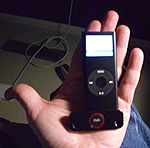 The BBC is recruiting podcasters to help cover the US mid-term elections. They’re looking for:
The BBC is recruiting podcasters to help cover the US mid-term elections. They’re looking for:
- Personal views of the race from people with an interesting perspective (perhaps you are a recent immigrant or an Iraq vet for example)
- Bloggers, podcasters and vloggers who are covering their local race.
- Anyone with a real interest in local politics and an ability to tell the story of the race in their town and state.
- People from overseas with a real stake in the result.
The BBC blog post suggests some ways to contribute:
- Phone or skype interviews
- Emailing us an audio report
- Emailing a short written report that we can read on air
- Pointing us to a blog, podcast or vlog you’ve made covering the election.
- Point us to a story you think we should be covering
The BBC says that “by enlisting your help we’ll have coverage that isn’t just about pundits and experts but gives us a real flavour of what the race is like for ordinary Americans that cuts through some of the stereotypes about politics in the US.”
One of the great strengths of our statewide radio networks has been the collaborative efforts of our affiliates. Radio station news directors throughout the states we serve would report on stories of statewide relevance, feed them back to the network, where we would uplink back to all stations on the network. Resulting in a whole that is greater than the sum of the parts.
But as radio station owners slashed their news operations (to reduce operating costs), a lot of “statewide” stories just didn’t get covered. It was all the local news folks could do just to keep on top of their “local” stories. No time to feed something to the network. (I should point out that many network affiliates still do an amazing job of contributing stories to our networks.) One can only hope that we’ll see a swing back toward strong, well-staffed local news departments.
But perhaps the next network will look more like what the BBC (and others) are putting together. Citizen Journalists (pick another name if you don’t like that tag) covering and sharing hyper-local news in an infinite variety of ways.
The tools already exist. A housewife in Joplin shoots 2 minutes of video outside her local polling place, including comments by those standing in line to vote. The Internet means distribution will never be a problem again. All that’s missing is some structure to pull it all together in some coherent manner. Perhaps something like the BBC effort.
“Yeah, but how do we make money with this model, smays?”
I’m not sure that is the right question but it’s a reasonable question.
First, the costs associated with setting up something like this are relatively small when compared to traditional broadcast networks with satellite trucks and producers and editors and so forth. But it would take time to grow (as did our networks). And you’d probably have competition since this is a game almost anyone can play.
So, is there enough profit in something like this to make it worth the investment of time and money? If you already have a cow that’s giving milk (cash), maybe not. If you don’t own a cow, this might seem like a good way to start building your herd. [via Podcasting News]

 One of my rationalizations for buying a new iPod nano was the Voice Memo feature. Plug a mic in and record directly to the iPod. I had no idea how well this would work until tonight when I plugged in a tiny little mic called the iTalk Pro from Griffin Technology.
One of my rationalizations for buying a new iPod nano was the Voice Memo feature. Plug a mic in and record directly to the iPod. I had no idea how well this would work until tonight when I plugged in a tiny little mic called the iTalk Pro from Griffin Technology. The BBC is recruiting podcasters to help cover the US mid-term elections. They’re looking for:
The BBC is recruiting podcasters to help cover the US mid-term elections. They’re looking for: